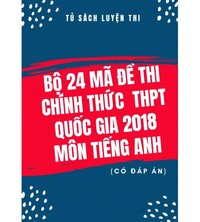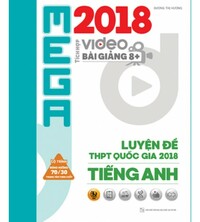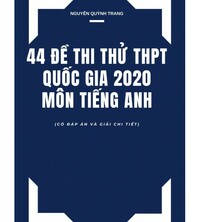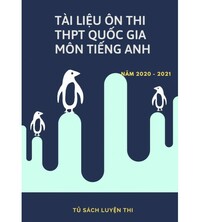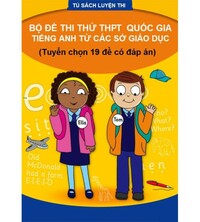Bộ đề thi thử THPT Quốc gia năm 2017 môn Tiếng Anh - Số 5
Hãy thử sức với Bộ đề thi thử THPT Quốc gia năm 2017 môn Tiếng Anh - Số 5 để biết khả năng hiện tại của mình cho kỳ thi sắp tới. Ngoài ra việc trực tiếp ôn, giải trên từng đề thi có cấu trúc cụ thể này sẽ giúp các bạn làm quen với dạng đề thi, từ đó nâng cao kĩ năng của mình và ôn tập lại kiến thức đã học.
Bộ đề thi thử THPT Quốc gia năm 2017 môn Tiếng Anh CÓ ĐÁP ÁN - Số 1
Bộ đề thi thử THPT Quốc gia năm 2017 môn Tiếng Anh CÓ ĐÁP ÁN - Số 2
Đề thi thử THPT Quốc gia năm 2017 môn Tiếng Anh - Đề 9
Find the word marked A, B, C, or D with the stress pattern different from that of the other three words in each question.
Question 3: A. commuter B. compliance C. competent D. computer
Question 4: A. participant B. accidental C. parentheses D. industrial
Question 5: A. competence B. compliment C. comfortable D. companion
Mark the letter A, B, C or D on your answer sheet to indicate the word(s) SIMILAR in meaning to the underlined word(s) in each of the following questions.
Question 6: I just want to stay at home and watch TV and take it easy.
A. sleep B. sit down C. eat D. relax
Question 7: I could see the finish line and thought I was home and dry.
A. hopeless B. hopeful C. unsuccessful D. successful
Question 8: We spent the entire day looking for a new apartment.
A. the long day B. all day long C. all long day D. day after day
Mark the letter A, B, C or D on your answer sheet to indicate the word(s) OPPOSITE in meaning to the underlined word(s) in each of the following questions.
Question 9: Fruit and vegetables grew in abundance on the island. The islanders even exported the surplus.
A. large quantity B. excess C. small quantity D. sufficiency
Question 10: She decided to remain celibate and devote her life to helping the homeless and orphans.
A. married B. divorced C. separated D. single
Identify the one underlined word or phrase marked A, B, C, or D that must be changed in order for the sentence to be correct.
Question 11: May I ask who was that man who was leaving the office when we came in?
A. when B. who C. May D. who was that man
Question 12: The Englishman was desperate to obtain another passport because he had lost one he had and he urgently needed to go back to England.
A. desperate B. one C. another D. urgently
Question 13: Get in touch with me when you need my help. You’ve got my phone number and address, have you?
A. and B. in touch C. when D. have you
Question 14: Polio, one of a group of spinal inflammations, causes fever and paralysis often resulting in disabled and deformity.
A. resulting B. disabled C. a group D. causes
Question 15: However types of raw materials are used in making paper, the process is essentially the same.
A. However B. materials C. in making D. the same
Mark the letter A, B, C, or D on your answer sheet to indicate the correct answer to each of the following questions.
Question 16: Well done! Sarah! You are top_____________ the class.
A. of B. on C. in D. at
Question 17: Many educationalists feel that continue________ is fairer than formal examinations.
A. assessment B. cramming C. judgement D. assignment
Question 18: I’m_____________ of her moaning about the job, if she doesn’t like it she should leave.
A. clean and tidy B. high and dry C. sick and tired D. prim and proper
Question 19: His doctor advised him to_____________ himself to three cigarettes a day.
A. border B. cage C. limit D. keep
Question 20: From the hotel there is a good_____________ of the mountain
A. vision B. view C. picture D. sight
Question 21: She worked really hard this year so she was given a 10% pay_____________.
A. inflation B. extra C. decrease D. increase
Question 22: The new law will_____________ effect in six months.
A. have B. bring C. take D. give
Question 23: After six months of convalescence in a nursing home, Simon is finally on the________.
A. mend B. go C. run D. top
Question 24: The_____________ told the candidates to turn over the question paper and begin.
A. tester B. assessor C. inspector D. invigilator
Question 25: - Jenny: “Thank you very much for your donation, Mr. Robinson.”
- Mr. Robinson: “______________________”
A. Delighted I was able to help B. I see.
C. You are right D. You can say that again.
Question 26: - Laura: “I’m having some friends over for dinner this evening. Would you like to join us?”
- Rex: “______________________”
A. Come on. It’s your turn. B. As a matter of fact, I do.
C. Can I take a rain check? D. Thanks, but I mustn’t.
Question 27: - Tom: “I thought your performance last Sunday was wonderful.”
- Laura: “_____________________”
A. I completely agree with you. It was terrific.
B. No doubt!
C. Don’t tell a lie. I thought it was terrible.
D. You must be kidding. It was not as good as I had expected.
Question 28: The exam was much easier than we expected, in fact, it was a piece of___________.
A. pie B. candy C. cake D. bread
Question 29: This letter_________ be from Harry. He doesn’t know my new address.
A. might B. can’t C. mustn’t D. shouldn’t
Question 30: Choose the best arrangement of the sentences marked i, ii, iii, iv, and v to make a short dialogue.
i. OK. And to drink?
ii. And would you like anything with it? Garlic bread or...
iii. Have you got mineral water?
iv. Nothing more, thanks. Oh yes, perhaps a green salad.
v. Yes, certainly. So that’s one four-cheese pizza, one green salad and one mineral water. Thank you, sir.
A. ii-iv-i-iii-v B. v-i-iii-ii-iv C. iv-v-i-ii-iii D. iii-i-v-ii-iv
Read the following passage and mark the letter A, B, C, or D on your answer sheet to indicate the correct word or phrase that best fits each of the numbered blanks.
The story of gold is an adventure involving kings, queens, pirates, explorers, conquerors, and the native peoples they conquered. Throughout history, gold has (31)_______ a magic spell over those it touched. Gold is beautiful and rare; a soft shiny metal that can be moulded into many (32)_______. It has been used for money, jewellery, and to decorate special buildings such as palaces and places of worship. (33)_______ the precious metal was discovered, prospectors rushed to mine it, starting new cities and countries as they went. Gold and the people who love it have helped shape the world we live in today. Gold is one of many elements, or substances that cannot be changed by normal chemical (34)_______, that are found in the Earth's crust. Gold has a warm, sunny colour and because it does not react with air, water, and most chemicals, its shine never fades. In its natural state, gold is soft and easily shaped. When heated to 1,062 Celsius it melts and can be poured into moulds to form coins, gold bars, and other objects. Stories have been told, movies made and legends born about the (35)_______ of the world's great gold deposits. It is a saga of dreams, greed, ambition and exploration.
Question 31: A. knitted B. sewn C. woven D. folded
Question 32: A. formats B. outlines C. shapes D. lines
Question 33: A. Whoever B. However C. Forever D. Wherever
Question 34: A. mode B. means C. course D. measure
Question 35: A. discovery B. revelation C. detection D. disclosure
Read the following passage and mark the letter A, B, C or D on your answer sheet to indicate the correct answer to each of the questions.
Of the six outer planets, Mars, commonly called the red planet, is the closest to Earth. Mars, 4,200 miles in diameter and 55 percent of the size of Earth, is 34,600,000 miles from Earth, and 141,000,000 miles from the Sun. It takes this planet, along with its two moons, Phobos and Deimos, 1.88 years to circle the Sun, compared to 365 days for the Earth.
For many years, Mars had been thought of as the planet with the man-made canals, supposedly discovered by an Italian astronomer, Schiaparelli, in 1877. With the United States spacecraft Viking I's landing on Mars in 1976, the man-made canal theory was proven to be only a myth.
Viking I, after landing on the soil of Mars, performed many scientific experiments and took numerous pictures. The pictures showed that the red color of the planet is due to the reddish, rocky Martian soil. No biological life was found, though it had been speculated by many scientists. The Viking also monitored many weather changes including violent dust storms. Some water vapor, polar ice, and permafrost (frost below the surface) were found, indicating that at one time there were significant quantities of water on this distant planet. Evidence collected by the spacecraft shows some present volcanic action, though the volcanoes are believed to be dormant, if not extinct.
Question 36: All of the following are true EXCEPT__________.
A. Mars is larger than Earth
B. It takes longer for Mars to circle the Sun than it takes Earth
C. Mars has two moons
D. Martian soil is rocky
Question 37: Man-made canals were supposedly discovered by__________.
A. Schiaparelli B. Phobos C. Viking I D. Martian
Question 38: The word “supposedly” in the passage is closest meaning to__________.
A. actually B. unquestionably C. formerly D. presumably
Question 39: Mars has been nicknamed__________.
A. Martian B. Viking I C. Deimos D. the red planet
Question 40: The Viking I exploration accomplished all of the following EXCEPT_________.
A. discovering large quantities of polar ice and permafrost
B. monitoring weather conditions
C. collecting information showing volcanic action
D. performing scientific experiments
Question 41: The word “myth” in the passage is closest meaning to__________.
A. fact B. event C. enigma D. legend
Question 42: It can be inferred from the passage that the radius of Mars is__________.
A. 141,000,000 miles B. 34,600,000 miles C. 4,200 miles D. 2,100 miles
Question 43: What is the main idea of this passage?
A. Scientists are no longer interested in the planet because there is no life on it.
B. Fairly recent studies of this planet reveal data that contradict previously held theories.
C. Very little of the Martian landscape has changed over the years.
D. Scientists are only speculating about the red planet.
Question 44: The word “monitored” is nearest in meaning to__________.
A. censored B. programmed C. televised D. observed
Question 45: Schiaparelli came from__________.
A. Mars B. Italian C. Italy D. Martian
Mark the letter A, B, C, or D on your answer sheet to indicate the sentence that is closest in meaning to each of the provided italicized ones.
Question 46. Kate works for an organization which collects money to help orphans.
A. The organization which Kate works for collects money to help orphans.
B. The organization where Kate works for collects money to help orphans.
C. The organization for that Kate works collects money to help orphans.
D. Money of orphans is collected in the organization where Kate works.
Question 47. Lin’s success took us all by surprise.
A. Lin was successful, which surprised all of us.
B. We took all of Lin’s successes surprisingly.
C. We were taken aback by all of Lin’s successes.
D. Lin’s success was surprised to all of us.
Question 48. I no longer speak to my neighbor since our quarrel.
A. I have spoken long to my neighbor since our quarrel.
B. I stopped speaking to my neighbor since our quarrel.
C. Before our quarrel, I spoke longer to my neighbor than now.
D. I have longed for speaking to my neighbor since our quarrel.
Question 49. The Minister said that he had not done anything improper.
A. The Minister denied doing anything improper.
B. The Minister denied that he would do anything improper.
C. The Minister refused to have done anything improper.
D. The Minister refused to do anything improper.
Question 50. Sue is too slow to understand what you might say.
A. So slow is Sue that she can’t understand what you might say.
B. Sue is not enough quick to understand what you might say.
C. Sue is so slow to understand what you might say.
D. What you might say, Sue can understand slowly.
Đề thi thử THPT Quốc gia năm 2017 môn Tiếng Anh - Đề 11
Mark the letter A, B, C or D on your answer sheet to indicate the word that differs from the rest in the position of the main stress in each of the following sentence.
Question 3. A. different B. important C. impressive D. attractive
Question 4. A. familiar B. impatient C. uncertain D. arrogant
Question 5: A. institution B. university C. preferential D. indicative
Mark the letter A, B, C or D on your answer sheet to indicate the word that is closest meaning to the underlined part in each of the following questions.
Question 6. The activists were accused of contaminating the minds of our young people.
A. providing healthy ideas C. harming
B. nurturing D. keeping in the dark
Question 7. To prepare for a job interview, you should jot down your qualifications, work experience as well as some important information about yourself.
A. what you have experienced C. your own qualities in real life
B. your bio data and special qualities D. what you have earned through study
Question 8: Scientists warn of the impending extinction of many species of plants and animals.
A. irrefutable B. imminent C. formidable D. absolute
Mark the letter A, B, C, or D to indicate the word or phrase that is OPPOSITE in meaning to the italic part in each of the following questions.
Question 9. Your experience with oil well fires will be invaluable to the company in cased of trouble.
A. valuable B. precious C. priceless D. worthless
Question 10. Ignoring the danger to himself, Freddie dived into the river to save the puppy.
A. Neglecting B. Overlooking C. Watching D. Noticing
Mark the letter A, B, C or D on your answer sheet to show the underlined part that needs correction.
Question 11. They asked me what did happen last night, but I was unable to tell them.
A. asked B. what did happen C. but D. to tell
Question 12. Your homework must to be done before class.
A. homework B. to be C. done D. class
Question 13. The more fast you drive, the greater danger you get.
A. The more fast B. drive C. the greater D. danger
Question 14. The meeting was so length that many people had to leave before it ended.
A. length B. many C. to leave D. ended
Question 15: Although they always argue with each other, but they are good friends.
A. always B. with C. but D. friends
Mark the letter A, B, C, or D on your answer sheet to indicate the correct answer to each of the following questions.
Question 16. __________ range in colour from pale yellow to bright orange.
A. Canaries which B. Canaries C. That canaries D. Canaries that are
Question 17. Rarely______ remove the entire roof if a dandelion because of its length and sturdiness.
A. can the casual gardener B. the casual gardener
C. the casual gardener will D. does the casual gardener’s
Question 18. His__________ son will go to school this fall.
A. five-year-old B. five-years-old C. five years old D. five years’ old
Question 19. There are__________ paintings on the wall over there.
A. two interesting little red French oil B. two little red interesting oil French
C. little two interesting oil red French D. two oil interesting red little French
Question 20. She spends a__________ deal of her time gardening.
A. big B. large C. great D. high
Question 21. It looked dark and heavy__________ it was going to rain.
A. although B. as if C. whereas D. unless
Question 22. Helen was__________ disappointed when she learnt that she hadn’t won the beauty contest.
A. seriously B. bitterly C. strongly D. heavily
Question 23. Tomorrow we will go fishing, weather__________.
A. agreeing B. allowing C. permitting D. giving
Question 24. Rescue teams continue to search for the people who got lost during the avalanche, but after so many days hopes are__________.
A. dying away B. disappearing C. fading D. flying away
Question 25. I’d opt for a glass of mineral water just to__________ my thirst.
A. quit B. quench C. quiver D. quieten
Question 26. - Q: “What do you think of his presence here?”
- A: “The longer he stays, __________ I dislike him”
A. the most B. the very more C. much more D. the more
Question 27. - Q: “Do you like that advanced training course you’re taking, James?”
- R: “______________.”
A. No, not everyone B. No, thanks
C. Not me, I’m still waiting D. By and large, yes
Question 28. - Q: “Sorry, I’m late Mike.” - R: “__________________.”
A. Well, it’s worth a try B. Not on my account
C. No, I wouldn’t mind at all D. That’s all right
Question 29: Western women are more___________ than Asian women
A. depend B. independent C. independently D. dependent
Question 30: Choose the best arrangement of the sentences marked a, b, c, d to make a short dialogue.
a. Oh yes, in the Evening Post?
b. 279616. Ann Beaton speaking?
c. That’s right. How much is it?
d. Hello, I'm phoning about your advertisement for a flat.
A. b-d-a-c B. d-b-c-d C. d-a-b-c D. b-c-d-a
Read the following passage and mark the letter A, B, C, or D on your answer sheet to indicate the correct word for each of the blanks.
NEIGHBORS INFLUENCE BUYING DECISIONS
However objective we believe ourselves to be, most of us do not judge a product solely on its merits, considering quality, value and style before making a decision. (31)________, we are easily influenced by the people around us.
There is nothing (32)___________ with this. It is probably a smarter way to make decisions than (33)________ on only our own opinions. But it does make life hard for companies. They have long understood that groups of friends and relatives tend to buy the same products, but understanding the reasons has been tricky. It is because they are so similar with (34)_______ to how much money they make and what television ads they watch that they independently (35)________ at the same decision? Or do they copy one another, perhaps (36)______ envy or perhaps because they have shared information about the products?
Research in Finland recently found overwhelming evidence that neighbours have a big influence on buying decisions. When one of a person’s ten nearest neighbours bought a car, the chances that that person would buy a car of the same brand during the next week and a half (37)__________ by 86 per cent. The researchers argued that it was not just a (38)_________ of envy. Used cars seemed to attract neighbours even more than new cars. This suggested that people were not trying to (39)_______ up with their neighbours, they were keen to learn from them. Since used cars are less reliable, a recommendation of one can (40)________influence a buying decision.
Question 31: A. What’s more B. Instead C. Unlike D. In place
Question 32: A. wrong B. silly C. bad D. daft
Question 33: A. basing B. trusting C. supposing D. relying
Question 34: A. connection B. regard C. relation D. concern
Question 35: A. reach B. come C. arrive D. get
Question 36: A. for B. as to C. out of D. about
Question 37: A. boosted B. rose C. enlarged D. lifted
Question 38: A. thing B. point C. matter D. fact
Question 39: A. keep B. stay C. hold D. follow
Question 40: A. fiercely B. strongly C. firmly D. intensely
Read the following passage and mark the letter A, B, C, or D on your answer sheet to indicate the correct answer to each of the following questions
Cities develop as a result of functions that they can perform. Some functions result directly from the ingenuity of the citizenry, but most functions result from the needs of the local area and of the surrounding hinterland (the region that supplies goods to the city and to which the city furnishes services and other goods). Geographers often make a distinction between the situation and the site of a city. Situation refers to the general position in relation to the surrounding region, whereas site involves physical characteristics of the specific location. Situation is normally much more important to the continuing prosperity of a city. If a city is well situated in regard to its hinterland, its development is much more likely to continue. Chicago, for example, possesses an almost unparalleled situation: it is located at the southern end of a huge lake that forces east-west transportation lines to be compressed into its vicinity, and at a meeting of significant land and water transport routes. It also overlooks what is one of the world’s finest large farming regions. These factors ensured that Chicago would become a great city regardless of the disadvantageous characteristics of the available site, such as being prone to flooding during thunderstorm activity.
Question 41. What does the passage mainly discuss?
A. The development of trade routes through United States cities.
B. Contrasts in settlement patterns in United States.
C. Historical differences among three large United States cities.
D. The importance of geographical situation in the growth of United States cities.
Question 42. The word “ingenuity” in the passage is closest in meaning to_____________.
A. wealth B. resourcefulness C. traditions D. organization
Question 43. The word “prosperity” in the passage is closest in meaning to_____________.
A. wealth B. richness C. customs D. fame
Question 44. The word “characteristics” in paragraph 1 is closest in meaning to_____________.
A. choices B. attitudes C. qualities D. inhabitants
Question 45. The primary purpose of paragraph 1 is to_____________.
A. summarize past research and introduce a new study
B. describe a historical period
C. emphasize the advantages of one theory over another
D. define a term and illustrate it with an example
Mark the letter A, B, C, or D on your answer sheet to indicate the correct answer to complete each of the following incomplete sentences.
Question 46. ____________ did Arthur realize that there was danger.
A. Only after entering the store B. After he had entered the store
C. On entering the store D. When he entered the store
Question 47. After seeing the movie Centennial, ____________.
A. many people wanted to read the book
B. the book was read by many people
C. the book made many people want to read it
D. the reading of the book interested many people
Question 48. Many of the current international problems that we are now facing ____________.
A. are the results of misunderstandings.
B. lacks of the intelligent capabilities of understanding each other
C. linguistic incompetences
D. are because of not understanding themselves
Question 49. Le: “I can’t understand how you missed the exit.”
Linh: “Well, it was so dark that ____________.”
A. we could hardly see the road signs B. we could see the road signs hardly
C. hardly could we see the road signs D. we could see hardly the road signs
Question 50. George didn’t do well in the class because ____________.
A. he failed to study properly B. he studied bad
C. he was a badly student D. he was not good study wise
